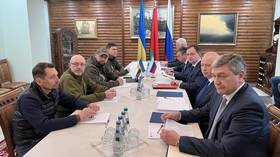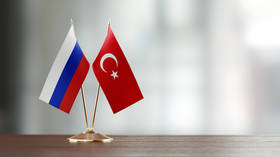Venue chosen for new Russia-Ukraine peace talks

Istanbul will be the venue for the next round of face-to-face peace talks between Russian and Ukrainian negotiators. The announcement came as Turkish President Recep Tayyip Erdogan leverages his ties with both countries in an effort to end the ongoing conflict.
Initial reports suggest that the sides will sit down at the negotiations table on Monday and continue discussions until Wednesday.
However, David Arakhamia, the majority leader of Ukraine's parliament and chief negotiator for Kiev, later clarified that the talks were scheduled to kick off in Turkey's largest city at 10am local time on Tuesday.
The Kremlin press secretary Dmitry Peskov also said that he doubted that the meeting would take place on Monday and said Tuesday is a more likely date.
The summit in Istanbul was announced by Arakhamia on Sunday. The negotiations are again giving Ankara a prominent role in the process. Turkey hosted the foreign ministers of Russia and Ukraine in Antalya earlier this month.
As a NATO member, the country has tried to walk a fine line between condemning Russia’s military offensive in Ukraine and maintaining its close economic and defense ties with Moscow. Ankara has opposed Western sanctions against Russia, but it also rejected a request to allow Russian warships to sail through the Turkish Straits into the Black Sea.
Speaking at the Doha Forum on Sunday, Erdogan’s spokesman, Ibrahim Kalin, cautioned against isolating Moscow, acknowledging that Russia “must be heard one way or another.” He added, “If everybody burns bridges with Russia, then who’s going to talk to them, at the end of the day?”
Erdogan reportedly urged Putin in a telephone call on Sunday to bring about a ceasefire and improve humanitarian conditions in Ukraine.
Turkey’s position is similar to that of South Africa, where President Cyril Ramaphosa has resisted international pressure to take a tougher anti-Moscow stance and has called for negotiations. Ramaphosa has also offered to mediate Russia-Ukraine peace talks, and said last week that NATO was at least partly to blame for causing the conflict.
“The war could have been avoided if NATO had heeded the warnings from amongst its own leaders and officials over the years that its eastward expansion would lead to greater, not less, instability in the region,” the South African president said.
Russia attacked neighboring Ukraine last month, following a seven-year standoff over Kiev’s failure to implement the terms of the Minsk agreements, and Moscow’s eventual recognition of the Donbass republics of Donetsk and Lugansk. The German and French brokered protocols had been designed to regularize the status of those regions within the Ukrainian state.
The Kremlin has now demanded that Ukraine officially declare itself a neutral country that will never join the US-led NATO military alliance. Kiev insists the Russian offensive was completely unprovoked and has denied claims it was planning to retake the two republics by force.













